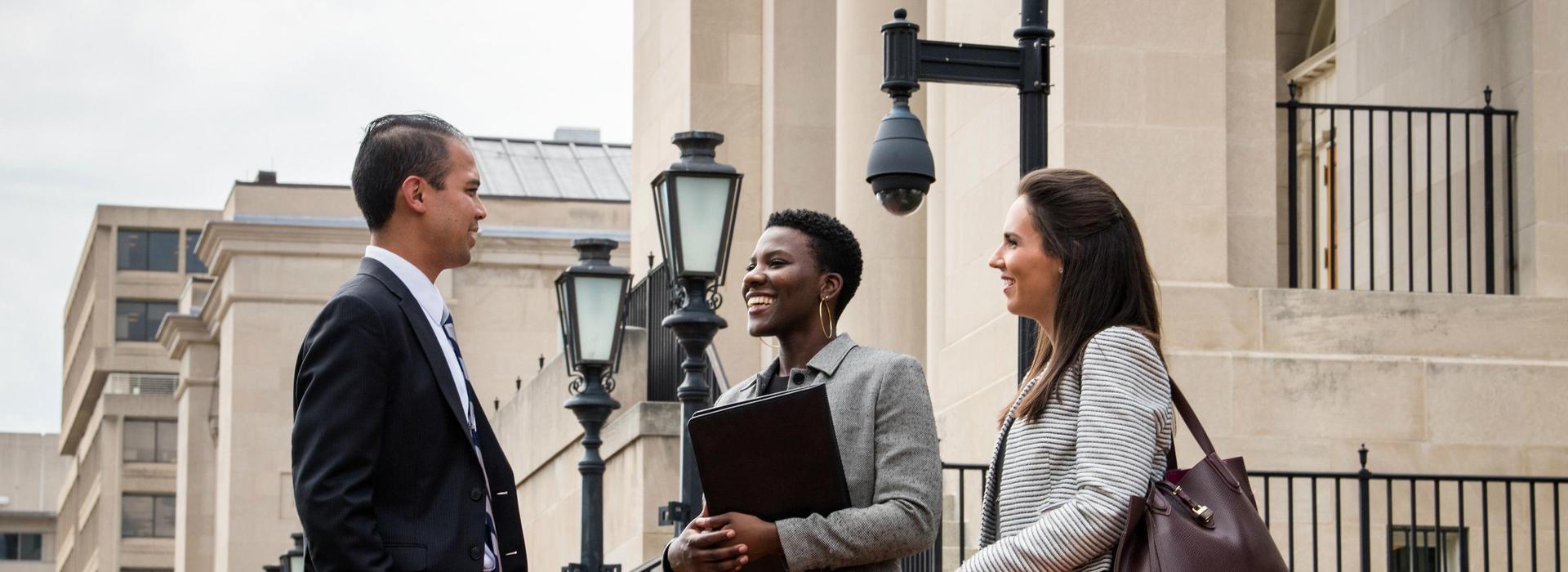


The interview is an opportunity for each party to gain insight into the other's personal qualities and professional qualifications. The employer already has considerable information about you from your resume and transcript, but wants to determine whether you will "fit" within the organizational culture and develop into a valuable member of the team.
Both parties in an interview need to know more about each other. Ideally, the exchange of information will be an interesting conversation and not an interrogation. Still, the interview is a professional, rather than personal, encounter, and the interviewee should ensure s/he is making his or her points while being responsive to the interviewer's questions. In responding to inquiries, you will have to expand the conversation, not merely answer the questions. Indeed, skillful interviewing often entails using a question to communicate what you want the interviewer to know about you, rather than merely giving a direct answer within a limited context. Still, remember that the employer's needs come first when hiring decisions are made, so demonstrate flexibility and an eagerness to serve the organization.
Because the key to interviewing successfully is preparation, take sufficient time to prepare yourself for the meeting. What are your goals, strengths and weaknesses? How do they relate to the job? Why are you interested in the kind of work that the job entails? Try to anticipate the types of questions you will be asked, and practice appropriate responses.
It is also critical to know the employer. What is their history as a business? What is the nature of the practice or business? Consult directories of lawyers, business reports and publications, government annual reports as well as Lexis or Westlaw databases for basic information on the employer. Use any contact you have to gain additional information, and always familiarize yourself with their web page.
Prepare for an interview by reviewing resource materials in the OCPD library. These resources include videotapes on interviewing skills and books on interviewing techniques. The books also provide sample questions that will likely be asked and those you may want to ask. After reviewing the materials, rehearse for interviews by arranging a mock session with an OCPD career advisor, or role play with a friend who will honestly critique your performance.
Finally, be prepared to discuss fully any information included in your resume or cover letter. If you referred to your honors thesis or any other body of work or activity in undergraduate, graduate or even outside of school, take the time to review what you did and the pertinent details. The last thing you want is to have to tell an interviewer that you cannot recall the result of your research or the name of the charitable organization for which you completed a project!
Carefully record the exact date, time and location of the interview and the name of each individual with whom you will be meeting. You may call the organization prior to the interview to obtain a list of the interviewers. Take multiple copies of your resume, writing sample, transcripts, and references to the meeting.
Your apparel should be conservative and appropriate for a law clerk or law-related position to ensure that your appearance does not distract from the interview. Remember, the interviewer is gauging how clients and co-workers will view you and how you will fit the organizational culture, and improper attire suggests poor judgment on your part. Questions? Consult OCPD.
Your demeanor is also important. You should be assertive and confident without being aggressive or overbearing. Before, during and after the interview, you should be courteous and pleasant to everyone, including non-attorney staff. Direct eye contact is imperative, and if more than one person is conducting the interview, make sure you make eye contact with each of them as you answer the questions. A proper display of self-confidence demonstrates to the interviewer that you know your own worth and can handle yourself with future clients. Be careful not to exhibit arrogance, conceit, or egotism, which may suggest a lack of humility and an inability to work as part of a team.
Outline points about yourself that you want to make and link them to the employer's needs. Review your resume and prepare to discuss everything on it. Consider questions that may arise about your "weaknesses" and develop responses to explain the positive lessons that you have learned from these experiences. These questions are asked by a variety of employers in both the public and private sectors, and you should be well prepared to respond fully but without defensiveness.
You should also ask questions. Structure your inquiries to fill gaps in your knowledge of the employer and to gain an understanding of both the work and the working environment. Questions about how work is assigned, whether client contact is likely (and when), and inquiries about mentoring or training programs are legitimate inquiries that demonstrate your understanding of how such issues can impact your ability to learn and the quality of your work education. The nature of your questions will also depend on whether you are interviewing for a government job, judicial clerkship, public interest or private law firm. Interviews for prosecutor's offices, for example, are generally somewhat different than law firm interviews.